The Chechen refugee in Strasbourg who says Moscow agents tortured him
- Published
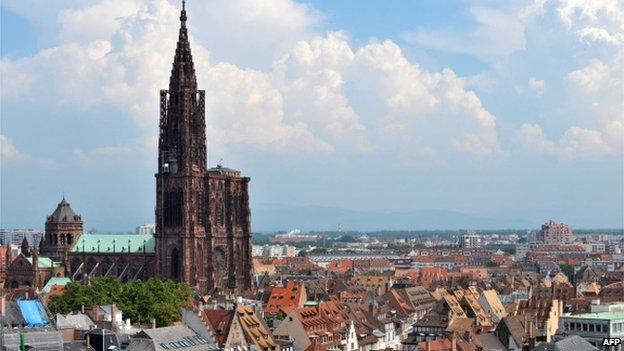
The abduction and torture allegedly took place in Strasbourg, eastern France.
Said Emin Ibragimov, who fled to France from Chechnya 14 years ago, always assumed he would be safe in his adopted home city of Strasbourg.
Before being granted asylum by the French government, he had been a marked man.
As a prominent member of the Chechen separatist movement - which had declared independence from Russia following the collapse of the Soviet Union - he had survived several assassination attempts back home, he says, as well as a knife attack in Istanbul.
But last August, in the supposedly safe city of Strasbourg, he says his enemies struck again.
The 68-year-old had been fishing in his favourite spot, a serene stretch of the River Ill near his suburban home.
Suddenly he heard a noise behind him.
Said Emin Ibragimov said he was attacked while out fishing
Several men appeared, one of them hitting him hard over the head.
"When I regained consciousness, we were in a boat on the river. They were polite saying let's come to an agreement," he recalled.
"But I told them I don't agree anything with thugs.
"They hit me again and when we were in the forest, they started torturing me, burning me with an iron and crushing my fingers until they crunched. The pain was terrible.
"They stabbed me in my legs with some sort of spike and burnt me with cigarettes."
Bearing the scars
It went on, he says, for more than two days, until finally they left him lying half dead in a ditch in the forest, his clothes covered in blood. It was night-time.
He woke up in the morning with rain pouring down on him.
Five months later he still bears the scars from his injuries.
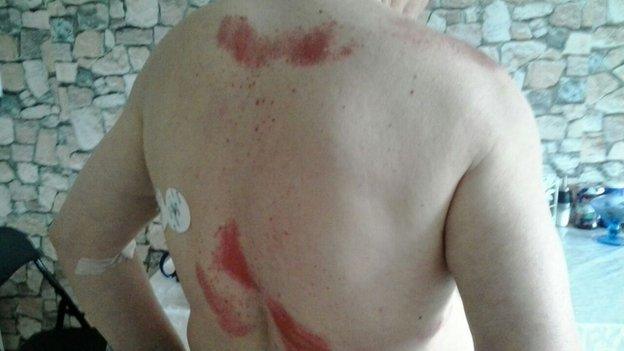
Some of the injuries suffered by Mr Ibragimov
At his small apartment he showed me the medical report provided by the Strasbourg hospital where he was treated.
It describes multiple burns and cuts on his body.
The hospital confirmed to the BBC that he had been admitted on 10 August last year.
So who was responsible for this attack?
"By the way they were talking, by their accents, these people were from Moscow," said Mr Ibragimov.
"I'm more than sure they were FSB agents. There's no other explanation."
The FSB is Russia's most powerful intelligence agency, once led by Russian President Vladimir Putin.
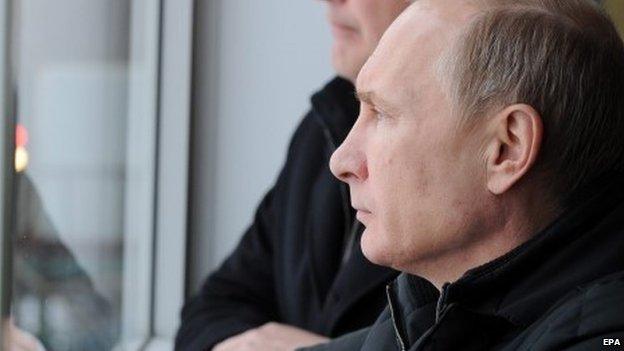
Mr Ibragimov was attacked after requesting an investigation into Russian President Vladimir Putin
Mr Ibragimov went on to show me another key document which he believes is the reason he was attacked.
It is a formal letter which he sent to the prosecutor of the International Criminal Court (ICC) in The Hague last July, just weeks before he was attacked.
In it he requests that a criminal case be brought against President Putin and other Russian officials for alleged war crimes, crimes against humanity and genocide against the Chechen people during the two wars with the Russian armed forces in the 1990s.
Dossier of evidence
Along with his letter he included a dossier of what, he says, is evidence collected over the past five years.
"The attack was because of this, clearly", he told me.
"I sent the documents to The Hague on 1 July 2014. After I received a letter from The Hague saying the documents would be looked at, the threats against me started.
"They were so open and blatant, they weren't afraid. They said I was slandering the president."
He also has a document which appears to be written by a senior French prosecutor which refers to an attempt in 2009 to assassinate up to four Chechen refugees living in Strasbourg, including Mr Ibragimov.
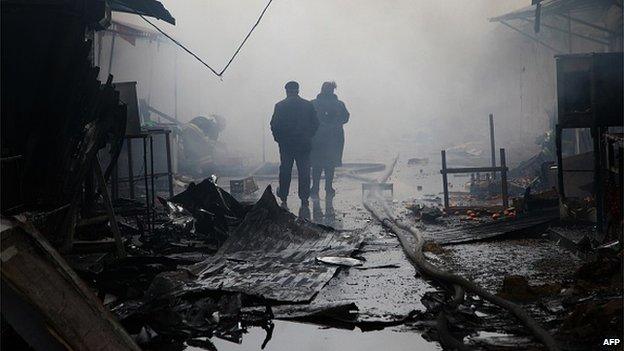
Chechnya is currently experiencing a resurgence of violence after years of conflict
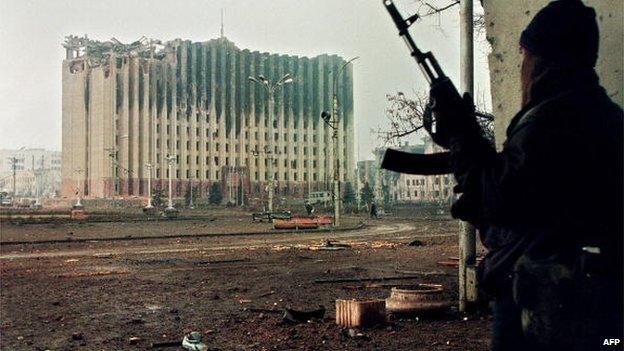
From the mid to late 1990s Chechen secessionists fought to gain independence from Russia
The prosecutor quotes the French intelligence agency as saying the team of hit men was sponsored by the current pro-Russian leadership in Chechnya.
Following the attack last August, Mr Ibragimov told me he had received yet more threats.
Most recently he says he was approached on the tram in Strasbourg by two men - one Chechen and the other Russian - telling him "to stop this, it will be more peaceful."
While he has no intention of withdrawing the case he has submitted to the ICC, he does now have several bodyguards to protect him.
In response to Mr Ibragimov's allegations that he was attacked by Russian intelligence agents, the BBC was given a statement by President Putin's spokesman, Dmitry Peskov in which he wrote: "This Chechen is known to us and unfortunately he is not completely psychiatrically healthy."
Across Europe there are other vocal opponents of the Kremlin who assume they are not safe wherever they live.
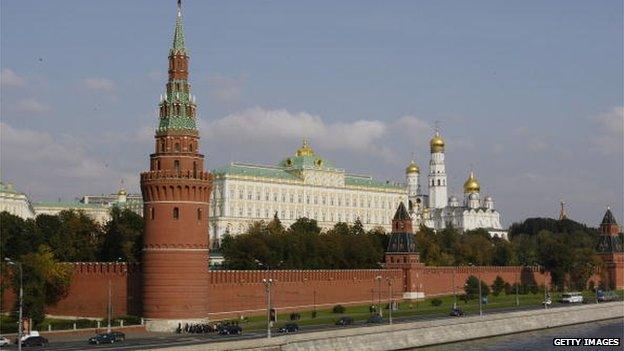
The Kremlin has dismissed Mr Ibragimov's allegations
In London, the fund manager Bill Browder has persistently campaigned against the Russian authorities after he says his investment company in Moscow was taken over by corrupt officials so they could commit a massive tax fraud.
His lawyer, Sergei Magnisky, who uncovered the alleged fraud, died in a Moscow prison cell.
Both he and Mr Browder were themselves subsequently convicted in absentia of tax fraud by a Russian court, in a trial denounced by human rights organisations.
Interpol has rejected Russia's requests to help extradite Mr Browder, describing the case as "predominantly political in nature".
That, Mr Browder says, led to a specific threat against him.
"We were given intelligence from the United States Department of Justice last summer that there was an illegal rendition attempt being organised against me," he said.
"The Russian government, according to the US Department of Justice, was going to try to kidnap me and take me back to Russia."
Like Mr Ibragimov, he too has security measures in place to protect him from what he believes is a very serious risk.
- Published19 December 2014
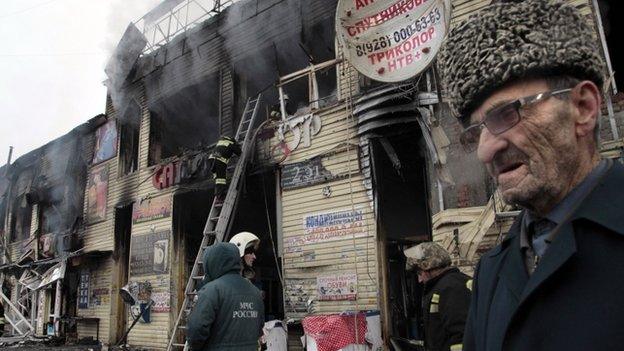
- Published13 October 2014
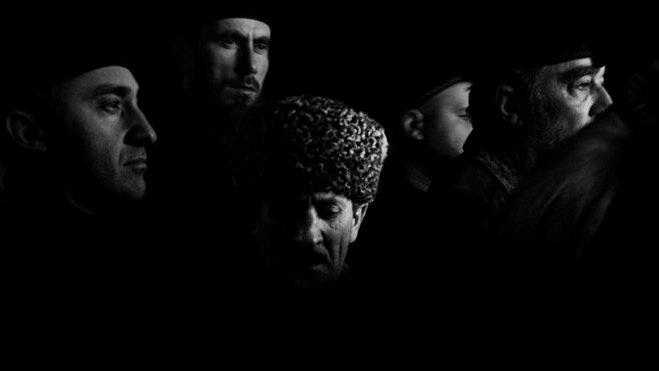
- Published17 January 2018